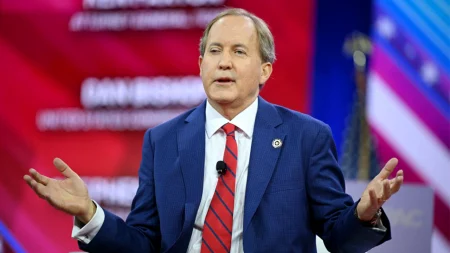Trump Campaign Pulls Ad Featuring Reagan’s Anti-Tariff Remarks Amid Policy Contradictions
Historic Reagan Speech Highlights Ideological Divide in Modern Republican Economic Policy
In a significant shift in campaign messaging, the Trump team has decided to discontinue an advertisement that prominently featured former President Ronald Reagan’s voice warning against protectionist trade policies. The ad, which utilized audio from Reagan’s 1987 address explicitly condemning tariffs, will cease airing on Monday, according to sources familiar with the campaign’s strategy. This development comes as former President Donald Trump continues to advocate for expanded tariff policies that stand in direct contradiction to the Reagan-era economic orthodoxy that defined Republican fiscal policy for decades.
The advertisement’s withdrawal highlights a fascinating evolution in Republican economic thinking over the past four decades. During his 1987 speech, Reagan articulated what was then considered foundational conservative economic philosophy, warning that “protectionism becomes destructive for working people” and arguing that tariffs ultimately harm American workers rather than protect them. Reagan’s administration championed free trade as a cornerstone of American prosperity, viewing economic barriers as counterproductive to growth and innovation. The audio excerpt used in the Trump campaign ad represented a clear articulation of traditional Republican economic principles that dominated party thinking from the Reagan era through the early 2000s. “Our trade policy rests firmly on the foundation of free and open markets,” Reagan declared in the speech, portions of which were featured in the now-discontinued advertisement.
The decision to pull the ad reflects the complex ideological repositioning occurring within the Republican Party under Trump’s influence. While traditional Republican economic orthodoxy embraced free trade and open markets, Trump has consistently advocated for what he describes as “fair trade” policies that often involve substantial tariffs on imported goods. During his first administration, Trump implemented significant tariffs on Chinese imports, European goods, and various commodities including steel and aluminum, framing these measures as necessary protections for American industries. More recently, he has proposed an even more expansive tariff regime, suggesting potential across-the-board import taxes of 10% or more. This approach represents a fundamental departure from Reagan-era economic principles and creates an awkward juxtaposition when Reagan’s anti-tariff rhetoric is used in campaign materials supporting a candidate with protectionist leanings.
The Evolution of Republican Trade Policy in the Trump Era
The apparent contradiction between Reagan’s free-trade advocacy and Trump’s protectionist stance reveals the dramatic transformation of Republican economic policy in recent years. For decades following Reagan’s presidency, Republican orthodoxy firmly embraced free trade, with administrations from both parties pursuing trade liberalization through agreements like NAFTA, CAFTA, and various World Trade Organization initiatives. This consensus began fracturing during the 2016 presidential campaign when then-candidate Trump challenged established Republican thinking by criticizing trade agreements and promising to bring manufacturing jobs back to America through tariffs and trade restrictions. “We’ve been ripped off by everybody,” Trump frequently stated during his 2016 campaign, “and we’re not going to be ripped off anymore.”
Since then, Trump has successfully reshaped Republican economic thinking to such an extent that many party members who once championed free trade have either moderated their positions or remained silent as protectionist policies gained favor among the base. Economic advisors close to Trump have worked to develop intellectual frameworks justifying this shift, arguing that strategic tariffs can address unfair trade practices, especially from China, and revitalize American manufacturing. Peter Navarro, who served as Director of Trade and Manufacturing Policy during Trump’s first term, has been particularly influential in providing academic justification for protectionist measures. “Tariffs are not an end in themselves but a tool to bring trade cheaters to the negotiating table,” Navarro argued in a 2018 Wall Street Journal op-ed defending the administration’s approach.
This ideological evolution has created challenges for Republican messaging, especially when invoking Reagan’s legacy. The 40th president remains an almost sacred figure in Republican circles, frequently cited as the standard-bearer for conservative principles. Campaign strategists have traditionally sought to connect their candidates to Reagan’s legacy, emphasizing points of continuity rather than departure. The withdrawn advertisement represented an attempt to associate Trump with Reagan’s popularity and moral authority while glossing over their fundamentally different approaches to international trade. “What we’re seeing is the Republican Party working through a significant ideological transition,” explains Dr. Jennifer Patterson, professor of political science at Georgetown University. “Reagan’s economic approach emphasized removing barriers to trade, while Trump’s approach focuses on using trade policy as leverage to secure better terms for American industries. These are fundamentally different philosophies.”
Campaign Strategy Shift Reflects Broader Policy Recalibration
The decision to pull the Reagan-voiced advertisement likely stems from recognition of the obvious contradictions it presented rather than any shift in Trump’s policy positions. Throughout his post-presidential period and current campaign, Trump has repeatedly doubled down on his protectionist trade stance, even suggesting expanding tariffs beyond targeted industries to become a comprehensive revenue generation mechanism. During a March rally in Ohio, Trump declared, “When foreign countries send their products to America, they should pay for the privilege. That’s why I’m proposing a minimum 10% tariff on all imports coming into our country.” This rhetoric stands in stark contrast to Reagan’s warnings about the harmful effects of such policies.
Political analysts suggest the campaign’s recalibration indicates increasing confidence in Trump’s protectionist message rather than any attempt to move toward traditional Republican trade positions. “The Trump campaign has clearly calculated that their base responds more positively to economic nationalism than to free-trade arguments,” notes political strategist Marcus Reynolds. “Pulling an ad that contradicts their candidate’s core economic message simply reflects message discipline rather than policy uncertainty.” Indeed, polling data suggests Trump’s trade positions have gained substantial acceptance among Republican voters, with a recent Pew Research survey finding that 78% of Republicans now believe tariffs are sometimes necessary to protect American industries, compared to just 36% who held that view in 2016.
The contradiction highlighted by the withdrawn advertisement extends beyond simple policy differences to fundamental questions about Republican economic identity. For decades, free-market principles formed the cornerstone of conservative economic thinking, with figures from William F. Buckley to Milton Friedman championing reduced government intervention in markets. Trump’s approach, sometimes described as economic populism or economic nationalism, represents a significant departure from these principles, emphasizing government intervention to shape trade outcomes rather than allowing markets to operate freely. “What we’re witnessing is not just a policy adjustment but a profound reimagining of Republican economic philosophy,” explains economist Dr. Robert Lindsey. “The party is moving from a position that viewed government intervention in markets with skepticism to one that embraces such intervention as necessary for achieving preferred outcomes.”
Implications for Economic Policy and Political Messaging
As the campaign moves forward without the Reagan advertisement, the incident illuminates broader questions about the future direction of Republican economic policy. Traditional free-market advocates within the party find themselves increasingly marginalized, while protectionist voices gain prominence. This shift has profound implications not just for campaign messaging but for potential policy implementation should Trump return to office. His campaign has outlined plans for expanded tariff regimes that would represent the most significant shift in American trade policy in generations, potentially reshaping global supply chains and international economic relationships.
The advertisement’s withdrawal also reflects the challenges of political messaging in an era of ideological transition. Campaign strategists must navigate complex terrain when invoking historical party figures whose positions may contradict current thinking. This tension extends beyond trade policy to other areas where the Republican Party has evolved under Trump’s influence, including approaches to international alliances, immigration, and the role of government in managing economic outcomes. Political communications expert Dr. Sarah Martinez observes, “Campaigns always seek to connect their candidates to popular party figures from the past, but this becomes problematic when fundamental policy differences exist. The Reagan ad withdrawal demonstrates the limits of this approach when contradictions become too obvious to ignore.”
As both parties refine their economic messages heading into the election, the discontinued Reagan advertisement serves as a reminder of how significantly American political alignments have shifted in recent decades. What was once considered orthodox Republican economic thinking now finds more receptive audiences among centrist Democrats, while economic nationalism has gained substantial traction within Republican circles. This realignment creates both challenges and opportunities for candidates seeking to articulate coherent economic visions that appeal to their evolving bases while maintaining enough consistency to appear principled rather than opportunistic.
The Trump campaign’s decision to stop airing an advertisement featuring Reagan’s anti-tariff message ultimately reflects the completion of a transformation in Republican economic thinking that began during the 2016 campaign. As the party continues to evolve under Trump’s influence, such adjustments in messaging will likely continue, highlighting the dynamic nature of political ideology and the ongoing process of redefining what it means to be a Republican in the twenty-first century economic landscape.










